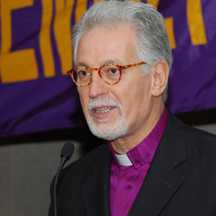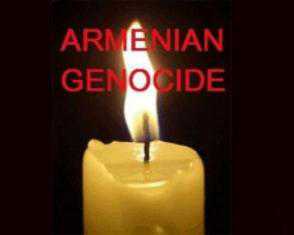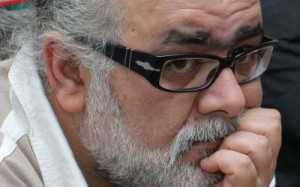Washington – Archbishop Vicken Aykazian is the Washington-based Legate of the Eastern Diocese of the Armenian Church and a prominent figure in international inter-faith dialogue. The Armenian Reporter’s Emil Sanamyan submitted questions to Archbishop Aykazian soon after his most recent trip to Turkey; the answers were then returned by e-mail.
 AR: What was the significance of the Surb Giragos re-consecration last October compared to the earlier renovation at Aghtamar?
AR: What was the significance of the Surb Giragos re-consecration last October compared to the earlier renovation at Aghtamar?
VA: Let me begin by saying that the October pilgrimage to Anatolia was a spiritual mission, which had no political goals whatsoever. The Diocese led a group of Diocesan leaders on a pilgrimage to the city of Diyarbakir (Dikranakert), in Turkey, where they took part in the October 22 re-consecration of the historic St. Giragos Armenian Church. Again, it was a spiritual mission, and the goal was to support the Armenian community of Turkey in celebrating this important milestone.
St. Giragos is the first Armenian Church in Anatolia to be re-constructed by the Armenian people after 1915. It was an all-Armenian effort to which Diaspora Armenians contributed. The Turkish government did not provide financial support.
This is one of the biggest Armenian churches in the Middle East, and right in the center of Anatolia, so I thought it was important to be present for the consecration there. As we saw, there are many people there who are ready to proclaim their Armenian heritage.
By contrast, Aghtamar was renovated entirely by the Turkish government and it’s not used as a sanctuary except once a year. It is mostly used as an ancient monument and tourist attraction site.
AR: There was a Turkish media report that about a dozen of Turks who are of Armenian descent were baptized at Surb Giragos. How significant is this?
VA: It is indeed a very significant development in Turkey. I think if there was a priest appointed to St. Giragos Church that number would grow.
During our time in Dikranagerd people from young children to the very elderly approached us and said they were Armenians, or someone in their family was Armenian – something that you never heard in the past. I believe this is going to be a first step, and a very important step.
AR: The size of the Istanbul community is estimated at 40,000 people. Is there an estimate for the Armenian population of Anatolia, including the “hidden” segment?
VA: Nobody knows about the exact number of the Armenians in Turkey. According to some Turkish intellectuals there are more than two million. However it is very difficult to know the number.
The property issue
AR: What does the recent Turkish government decision on return of some of the previously confiscated properties to minority foundations mean as far as the Istanbul patriarchate?
VA: The decision of the Turkish government on the return of properties to minorities does not only apply to Armenians, but also for example, Greeks, Assyrians, Syrians, and Jews. We hope we will benefit from this.
The church in Dikranakert is in the process of receiving some of the lands that belonged to it. The Patriarchate is working this out now. And more importantly, the Armenian Patriarchate of Jerusalem has a lot of land and property in Turkey, so they too are trying to get back their properties.
But I think it’s too early to say how successful this will be. Time will show. But I hope that this law won’t only be on paper. I hope it will be put into action.
AR: Is there an inventory list of Armenian Church properties in Anatolia that the church hopes to get back? How many Armenian churches now operate in Anatolia?
VA: I am not aware about the inventory of the entire Armenian Church property. There are now a total of four operational churches in Anatolia: in Diyarbakir, Kayseri, Iskenderun and in nearby Vakifkoy.
Too early for business as usual
AR: Turkish media reported that the Diocese delegation met with executives at Çal?k Holding, a government-connected business conglomerate. Were you in that meeting and what was its purpose?
VA: I was present during the meeting with Çal?k. There was no conversation about doing business at all. It was about the relationship between our two peoples [Armenians and Turks].
AR: What is your view of Diaspora Armenian businessmen investing in Turkey?
VA: Any Armenian who does business with Turkey will not ask for permission. I personally would not do it.
AR: But as Turkish government is moving away from its previously uniformly hostile attitude towards Armenians, should Armenians also begin to change their attitude towards Turkey and if so, how?
VA: I personally believe that there should be a dialogue between the government of Armenia and the government of Turkey. No problems could be solved without dialogue. I believe that Armenians should consider rethinking some positions, but without giving up our demands.
I recently spoke with the Hürriyet newspaper in Turkey. They asked me if the Armenian Genocide would be part of the dialogue. I said that the Armenian Genocide is not a negotiable issue, but when we speak about the dialogue everything should be put on the table.
AR: What is the significance of Erdogan’s apology over Dersim massacres of 1930s? Could this become a precedent for an apology over the Armenian Genocide?
VA: It’s very interesting the evolution that is taking place in Turkey. The approach of Prime Minister Erdogan is even more interesting. The most recent thing he did was to apologize for the massacres of the 1930s. I believe it is possible that Turkey is trying to approach the decision to apologize to Armenia and the Armenian people.
via Armenian Reporter:.
 The association issued a statement condemning threats voices against MP by Turkish nationalists.
The association issued a statement condemning threats voices against MP by Turkish nationalists.



